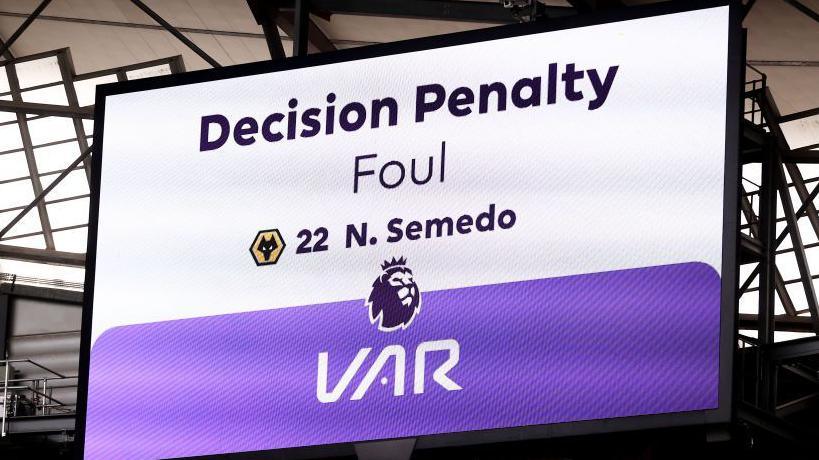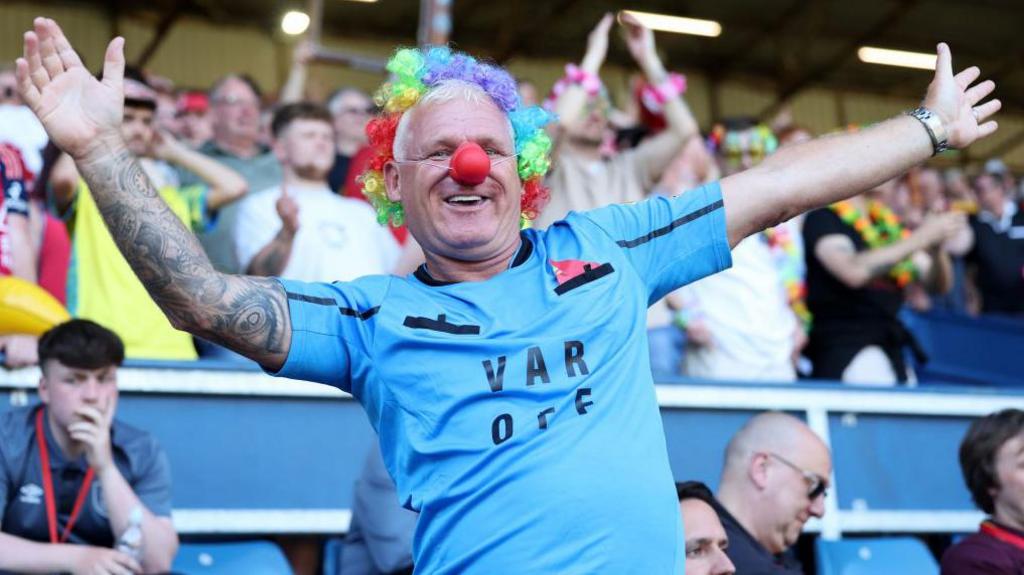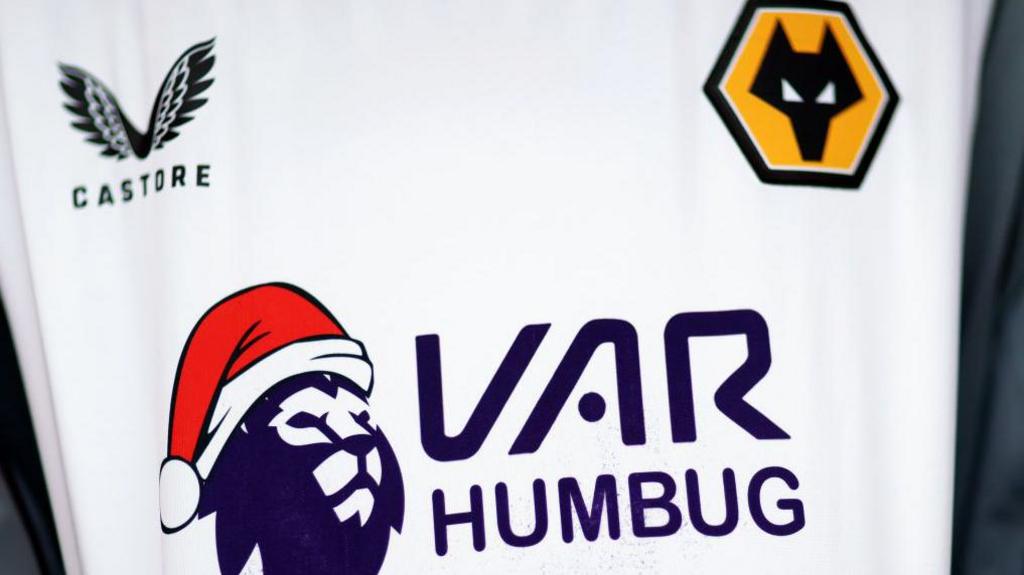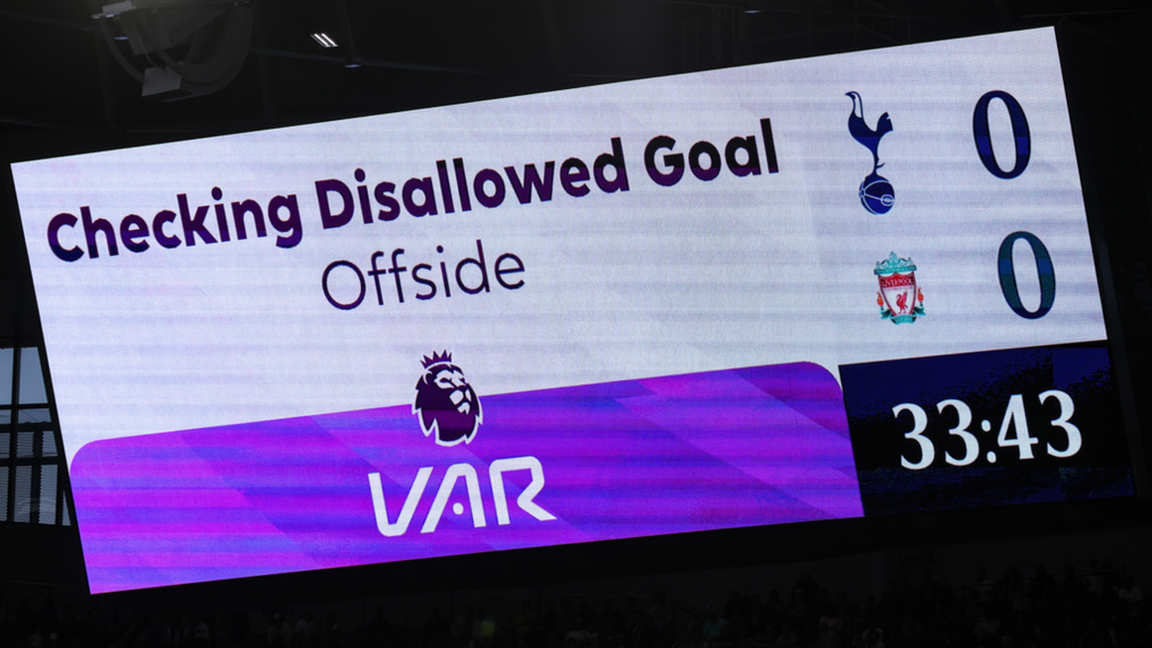VAR decisions explained on X - what else is new?

Wolves issued a statement in May with nine reasons why video assistant referees (VAR) should be scrapped - including their belief that it has led to a more hostile atmosphere towards officials
- Published
The 2023-24 Premier League season ended with Wolves triggering a vote to scrap the use of video assistant referees after a season of acrimony around the standard of refereeing and impact of technology on football.
Wolves lost the vote 19-1 but the Premier League promised to improve VAR.
As VAR enters its sixth season in the top flight, the Premier League says fans can expect quicker decisions, fewer interventions, more emphasis on backing the referee's judgement - plus "near-live" explanations of VAR calls on social media platform X.
BBC Sport outlines the key talking points and changes, following briefings with the Premier League and referees' chief Howard Webb this week.
New: VAR explanations on social media
Allow X content?
This article contains content provided by X. We ask for your permission before anything is loaded, as they may be using cookies and other technologies. You may want to read X’s cookie policy, external and privacy policy, external before accepting. To view this content choose ‘accept and continue’.
It was announced this week that the Premier League Match Centre, external account on X will post "near-live" explanations of VAR decisions.
The sport's lawmakers Ifab have ruled out broadcasting the in-game discussions between officials as audio or video as "too chaotic", but are continuing trials of referees announcing decisions to the crowd, as seen in the 2023 Women's World Cup.
So for now, Premier League chief football officer Tony Scholes and Webb say that to improve the experience for fans at top-flight games this season they plan to "put more replays on the big screens" and make more use of social media.
Scholes said the Premier League are "potentially" going to trial in-game announcements, but not just yet because "with the changes we're making we don't want to put additional pressure on the referees".
Webb hosts a regular show called Match Officials Mic'd Up which plays out the audio discussions between referees and the VAR around selected key decisions. He said he was "somewhat disappointed" by Wolves' bid to scrap the technology.
'Referee's Call': Will we see less VAR this season?
Since VAR was introduced, the guidance for its use has always been to correct "clear and obvious errors". That measurement can also be subjective.
'Clear and obvious' remains the key test. But Scholes said they have a "six-point plan" approved by clubs and explained to players, which includes:
Introducing a "Referee's Call" approach similar to cricket with VAR as a "safety net"
"Reaffirming a high bar" for VAR intervention - not re-refereeing subjective decisions made by on-field officials
Making sure people understand VAR will not achieve perfection
Scholes explained: "When we do see [VAR] we'll see it applied quicker so that the delays that occurred after the incident at Liverpool last year which damaged everybody. I think you'll see a reduction in delays and fewer VAR interventions."
Webb said: "We have the lowest intervention rate of all the major leagues already. It is 0.29 interventions per game."
"What you will see is more efficiency. We know here that people don't want forensic examination when that's not necessary. We're looking for those clear errors that should jump off the screen and if that doesn't exist in the situation then 'check complete' and we move on."
“We acknowledge there are areas we can do better – there were some high-profile situations last season which resulted in clear errors not being rectified. That’s our role to fundamentally rectify those clear errors and to do that as effectively and efficiently as possible."
The stats: 105 correct VAR calls & 35 incorrect VAR uses

The Premier League said its own figures showed the overall number of correct decisions in matches was at 96%, compared with 82% before VAR was introduced.
There were 31 incorrect uses of VAR last season - a mixture of wrong interventions, VAR intervening when it should not have done, and VAR not intervening on a clearly incorrect on-field decision. There were 35 the season before.
There were 105 correct VAR calls last season, the same as 2022-23 but with fewer mistakes.
More than 1,300 key decisions were assessed - on-field and by the VAR.
"There were actually less errors last year than before. A small number of incidents live large in the memory," Webb added.
He also said that match officials, including VAR, "only actually take away one in every 25 goals".
Scholes said the system will "never be perfect" and accepts that VAR "comes with a cost", but explained: "The cost is partly inevitable – there are delays to the game, the supporter experience is poor. We know that and we’re not going to get rid of that - it’s an inevitable part of VAR. But our job is to minimise it."
What about the speed of decisions?
In a briefing document issued by the Premier League to its 20 clubs before last season's vote to scrap VAR, it said the average delay to a game for a single VAR check lasted 64 seconds in the 2023‑24 season.
That was longer than the 40-second average in 2022-23.
Webb said: "There was undoubtedly more caution shown by the officials after that [Liverpool's Luis Diaz] situation.
"I think fundamentally a lot of the frustration comes not out of the final decision - when people take a step back they know the game throws up debate - but sometimes it can slow the game down, it can take up time to get to that decision and even if it is correct in the vast majority, if it's taken too long to get there it can get frustrating."
When will semi-automated offsides be introduced?
One area that has been shown to improve speed and accuracy is semi-automated offside technology (SAOT).
It will not be in place for the start of the new season, but Scholes said the "expectation" was for October.
Fifa first used the technology at the 2022 men's World Cup in Qatar and it was also in operation at the men's Euros this summer.
It is anticipated SAOT could cut the length of a VAR check for offside by 31 seconds. It saves officials time drawing offside lines on monitors.
Scholes added: "We're going to bring it in when we're absolutely certain that it will work properly and improve things. We'll be testing it through the first match rounds of the year, it will be working in the background.
"We're bringing in a new system, a different system which is more accurate than the system which is in use in other competitions."
'Four out of five fans in favour of VAR'
Scholes said an independent survey commissioned by the Premier League, with 1,300 respondents, showed "four out of five want to keep VAR".
He added: "That says one in five would get rid of it and that’s a big minority. And most of the four out of five say we need to improve it."
The Football Supporters' Association (FSA) challenged this claim, saying it made the Premier League "appear to be in denial".
The FSA said its own research on VAR "has shown it is deeply, deeply unpopular with match-going fans".
Premier League sources told BBC Sport it is willing to share details of the survey with the FSA, that it is not complacent about the results, and is focused on the one in five fans who want to get rid of VAR.
BBC Sport understands only one in 10 of the match-going attendees said they would keep VAR in its current form.

Wolves fans protested against VAR during the 2023-24 season
VAR blame game to be addressed
BBC Sport understands the Premier League has used the summer break to speak to clubs and managers about the impact of public criticism of VAR undermining the game - and that there will be a new focus on regulating these public comments.
Sources told BBC Sport the Premier League felt it became too easy to blame VAR as a deflection.
On the pitch, there were 12 manager touchline bans last season, up from three the season before, and 106 technical-area yellow cards - up from 35.
Off the pitch, there were several flashpoints around VAR last season:
Wolves manager Gary O'Neil called one VAR offside decision "the worst he had ever seen" and was banned for his behaviour.
Liverpool had a goal against Tottenham incorrectly ruled offside because of "significant human error" - prompting an apology, review and widespread fallout.
Nottingham Forest and manager Nuno Espirito Santo were charged, with their referee advisor Mark Clattenburg eventually leaving the club, in the aftermath of being denied three penalties in a defeat by Everton. Forest claimed VAR Stuart Attwell was a fan of Luton Town - one of their relegation rivals - and former Premier League official Clattenburg called the decisions a "joke".
Liverpool, Arsenal, Wolves and Forest all issued official club statements criticising refereeing standards and VAR.
- Published7 February 2024

- Published11 August 2023
